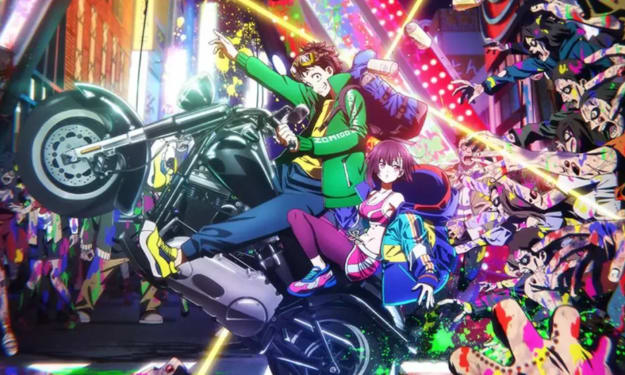How Netflix’s “I Think You Should Leave” Is Deeper Than You Think
See how Cringe Comedy can teach us to be more human

The other day I was watching the latest season of Tim Robinson’s absurdist sketch comedy series, I Think You Should Leave, and throughout my watch of this collection of absurdist humor, I noticed that there was some depth to these sketches that I haven’t realized before. While this depth could be a complete overthought, I believe that there is enough evidence to prove it. So lets explore the various layers of I Think You Should Leave and examine why it is deeper than you think.
Defining Cringe Comedy
The sketches of I Think You Should Leave specifically use a subgenre of comedy called Cringe Comedy. Cringe Comedy is a type of comedy that uses embarrassment and discomfort as the source of its humor and usually involves placing characters in awkward or uncomfortable situations that ultimately devolves into something worse. To be more specific, the humor of these scenarios often comes from the tension between the characters discomfort.

The nature of these situations are all designed to be completely relatable and practically unavoidable in our lives. Situations such as social awkwardness, miscommunication, or public humiliation are all things we wish we could avoid in our day-to-day lives, but when it inevitably happens due to circumstance we can’t help but die of embarrassment. However, when we see other people go through this, we as an audience can’t help but laugh at their misery and share their pain.
How Cringe Comedy Is Super Deep
Depending on the way it is used, Cringe Comedy can show how our social norms and expectations can be damaging or restrictive. It can also highlight how social hierarchies and power dynamics can lead to uncomfortable or humiliating situations for those with less power.

In fact, some of the most memorable sketches in I Think You Should Leave frequently highlight themes of how we should be more caring and empathetic to the socially awkward. While majority of the sketches in ITYSL goes from zero to a hundred in a matter of seconds, they actually have a deep rooted moral message that has a strong emotional impact. By recognizing these messages, we suddenly go from laughing at the dumb and absurd to rooting for the odd and unhinged.
Defining The Typical 'ITYSL' Sketch
The typical setup to an I Think You Should Leave sketch usually has a character doing or saying something dumb or irrelevant, but instead of admitting their mistakes and moving on, they double down in order to prove everyone wrong. While these characters go to extreme lengths in order to prove their point, their actions can allude to the audience's experiences of being placed in a similar scenario.
The ‘Door’ sketch is a clear example of how we must do everything we can preserve a reputable social image. The determination of Robinson’s characters to double down on their mistakes to get out of trouble is something the audience wants to root for. I mean, let’s be honest here, who hasn’t wished that they have made a comeback after accidentally doing or saying something extremely awkward and weird.
The Need For Social Acceptance
The quirky nature of I Think You Should Leave characters often exhibit insecure and anti-social tendencies that at first comes off as very weird and unhinged. However, its only until the end of the sketches we realize how human they are. The compilation of workplace office sketches shown below all highlight how personal insecurities can cripple our social interactions with our coworkers and peers alike.
The 'Whoopie Cushion' sketch showcases how a simple prank can go too far for somebody who has extremely sensitive body issues. The 'Bozo the Clown' sketch shows the audience how difficult it is for the socially awkward to get into a conversation that they know nothing about.
However, the ‘Copy Machine’ sketch with Patti Harrison really highlights how important and dangerous the need for social acceptance is, as Harrison plays a character who absolutely bombs at telling light-hearted office jokes and inadvertently spirals out of control because of it.
Watching how Harrison's character continually bomb joke after joke and eventually lashing out in order to get a feeling of validation from her coworkers is something we have been through at least one point of our lives. So at the end when Harrison finally gets a laugh from one of her coworkers, she calms down for receiving that validation and even gets a sense of emotional catharsis from it.
The juxtaposition of Harrison’s interaction with the majority of her coworkers vs. the one who laughed at her joke shows us how powerful social exclusion and a small compliment can drastically affect our mood in a social setting. It even accurately nails how sad it can feel when you're clearly marked as "different" from a crowd of your respective peers.
This sketch alone explores how everyone wants to be recognized, and while we will fail time and time again to make that happen, all it takes is just one person to make you forget about the past bombs and feel a sense of validation and belonging.
The Cruel Nature Of Assumption
Of course, at its core, I Think You Should Leave is an absurdist comedy series and revels in the ridiculous and the nonsensical, creating scenarios that are so over-the-top that we can’t help but laugh. However, even within this absurdity, some of these sketches can show us how cruel and unempathetic we can be.
The prime example of this case is the ‘Ghost Tour’ sketch where Robinson plays a character who goes on a haunted house tour and gets kicked out because of his crude and immature questions. While the sketch is simple and nonsensical as it gets, but at the end of it you get a little glimpse into the character's life and you suddenly begin to feel bad for him.
Just by carefully looking at the last couple of seconds of this sketch where he gets kicked out of the tour and is picked up by his mother, tells us an enormous amount of detail about this character’s backstory. The fact that he is getting picked up by his mother who has an excess amount of religious relics in her car indicates that Robinson’s character does not drive, must have lived a very sheltered life, and depends on his overbearing and extremely religious mother for everything.
So Robinson’s character taking part in an ‘adult haunted house tour’ was probably the first time he’s ever been allowed to swear, and he took full advantage of what could be his last chance to express his newfound freedom. While he does so and takes it to the extreme, the crowd was unempathetic to his behavior and immediately ostracized him.
This sketch shows us how quick we can be to judge people and really highlights how impatient we can be when we are forced to interact with people we don’t immediately vibe with. In addition, it shows us how our first impressions and assumptions about people can have a harmful effect on their personal lives especially if we confront them when they are at their most genuine and innocent.
Completely Coincidental?
While the argument can be made that these 'emotionally charged' sketches could be coincidental, there is actually a large number of sketches that follows this kind of format. This rings especially true in the third season of the show where some of the longest sketches have an 'emotionally charged' ending.
Sketches like 'Shirt Brothers', 'The Office Party', 'Sitcom Taping', 'Randall is interesting', and 'The Man who talks about his kids' are all sketches that follows a formula of introducing odd and unhinged characters that we all initially laugh at, but find out that they are just simply misunderstood for their actions.
You Sure About That?

Yes I am, because while I Think You Should Leave may appear to be a simple sketch comedy series on the surface, it is clear that there is a certain level of depth to the show that is often overlooked because of the show's ridiculous nature. The show really hints at a thought-provoking commentary on how we socialize and interact with each other, but if you don't believe me, try watching the show and see if there isn't something deeper than a bunch of unhinged people yelling at each other.
What do you think? Is the series super deep or should I leave and try to get a job at Corncob TV? If you liked what you read, be sure follow for more related content!
About the Creator
Jay Kobayashi
A starving writer from LA who aspires to be plagiarized one day. I like to write about academic pieces that identifies philosophy and psychology in pop culture, and sometimes random fun pieces that interests me or the algorithm!






Comments
There are no comments for this story
Be the first to respond and start the conversation.